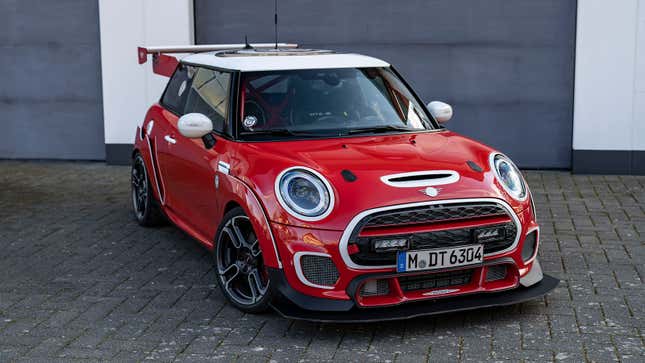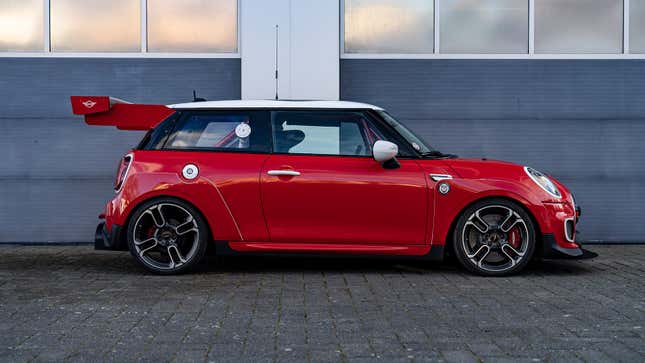Now introducing “Wing Of The Day” — a new series here on Jalopnik that I invented five minutes ago where we’ll pay tribute to those aerodynamic appendages that master form and function, as only the finest wings do. Today we’re recognizing the wing on the back of Mini’s John Cooper Works-derived Nürburgring 24 Hour race car that the brand unveiled on Tuesday. Tomorrow this series most definitely won’t continue because I didn’t clear it with any of the editors that actually make decisions around here. Ah well. It was fun while it lasted.
As long as we’ve gathered, though, let’s talk about this Mini. It’ll be campaigned by Bulldog Racing in the event, which will kick off May 28. It’ll compete in the SP3T class, a category for vehicles with turbocharged engines up to two liters in size. And while it may have started its life as a road-going hot hatch, the modifications Bulldog’s made to it have transformed it into a worthy denizen of the Green Hell. From BMW’s press release:
The base vehicle is a MINI John Cooper Works with the 4-cylinder turbo engine known from the MINI John Cooper Works Clubman and MINI John Cooper Works Countryman with 225 kW/306 hp and a maximum torque of 450 Nm. The 8-speed Steptronic gearbox taken from large-series-production featuring an integrated, mechanical differential lock with a locking effect of up to 70% ensures that the drive torque is converted into thrilling performance without any losses.

Right out of the gate, engineers swapped out the stock 228-horsepower JCW Cooper motor for the one in the Clubman and Countryman, which develops almost another 80 horsepower. The eight-speed auto appears to be the same one the production car gets — an Aisin unit — coupled with a mechanical diff lock. The rest of the changes read as follows:
• A racing cage specially developed for this model was installed.
• The fuel tank volume was increased to 100 litres.
• Far-reaching interventions in the aerodynamics, including an adjustable rear wing, a completely covered underbody, a rear diffuser and front splitter were made.
• Weight was consistently reduced, e.g. by using Makrolon® window panes.
• A model-specific racing suspension with adjustable rebound and compression damping was fitted.
• All moving chassis and suspension parts were replaced with reinforced Uniball bearings
• A pneumatic lifting unit was installed.
• The sports exhaust system was adapted with a racing catalytic converter
• Original BMW M Performance brake components were installed.
And let’s discuss that adjustable rear wing. My colleague Lawrence recalled the venerable Suzuki Escudo Pikes Peak hill club conquerer the moment he saw it. He’s not wrong. “You could eat dinner on that wing,” Lawrence said of the Escudo. “You could beat Gran Turismo 3 with that wing,” I replied. That’s good company for the little Mini to find itself in.

Likewise, you might assume those wild pop-out front and rear fenders are also modifications explicitly made for racing. Nope! As it turns out, you could visit a Mini dealer lot and find those very flares on a $45K John Cooper Works GP — if there were cars on dealer lots right now.
Mini tells us 2022 will mark the first time a JCW hardtop has run in the Nürburgring 24 Hours in a decade. I’m no driver, engineer or race strategist but I reckon that with a wing like that, it couldn’t possibly lose. Or at least it couldn’t, if this was any other event. We’re talking about 24 hours here — around the Nordschliefe, no less. It’s entirely possible this Mini is beaten to the line by a Dacia Logan when this war of attrition trundles to a close on Sunday afternoon.